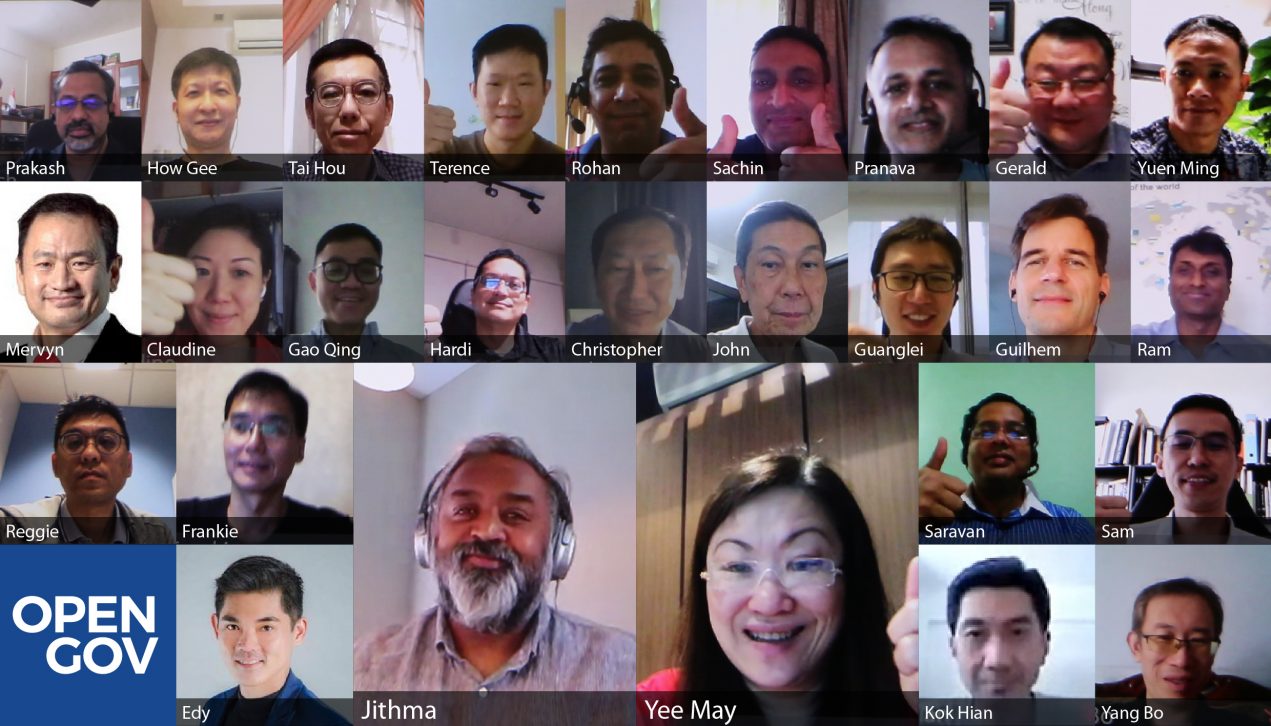
Cloud has emerged as the biggest enabler in assisting businesses to operate and thrive in these unstable times. Most organisations have transitioned to a full cloud or hybrid data storage model to ensure their employees can work seamlessly from remote locations.
As the shift to the cloud was done, in many cases, hurriedly as a reactive measure due to the severity of the pandemic, it may not have been the best in terms of security. Organisations are now feeling vulnerable and exposed because they do not know how best to make their cloud platforms more secure and reliable.
OpenGov Asia hit the nail on the head with the OpenGovLive! Virtual Breakfast Insight it organised for delegates from various agencies and organisations in Singapore to discuss the reliability and efficiency of their cloud strategies to deliver mission-critical services.
The Virtual Breakfast Insight on 26 November 2020 witnessed an overwhelming response from the delegates both in terms of their attendance and engagement.
The pace of transformation has picked up significantly but security is still a concern

Mohit Sagar, Group Managing Director and Editor-in-Chief at OpenGov Asia opened the session with a quick round of introductions in the virtual room and set the tone for the discussions to follow.
He acknowledged that cloud technology is not new, but its acceptance and adoption have risen significantly in the COVID-19 era.
Drawn into the digital transformation wave, citizens are becoming increasingly reliant on digital solutions, pushing governments and private service providers to be more adaptive and accessible in service delivery.
Mohit also pointed out that though the pace of transformation has picked up significantly, security still remains a big concern. Most certainly, the public sector that harbours much sensitive information on its citizens and residents, needs to be extra cautious in this regard.
Digital solutions in the new normal demand rapid digital transformation strategies that are well thought out and planned, keeping accessibility, agility and security as the pillars on which everything else develops.
In conclusion, Mohit urged delegates to not waste any time trying to do all this in-house. He stressed the power of a well-coordinated partnership with experts to attain stability and security in their cloud operations.
Organisations must Innovate their digital infrastructure

After Mohit’s opening, Yee May Leong, Managing Director, Equinix South Asia took to the virtual podium to share her insights with the delegates.
Yee May emphasised the need to fast track digital strategies and the pivotal role leaders play in driving them. She shared that the most optimal way of doing it is minimising the distance and cost between employees, customers and other stakeholders.
She went on to explain the role that digital infrastructure plays in driving this advantage and how Singapore’s Smart Nation Program has made this digital infrastructure is easy to access
Yee May encouraged delegates to focus on three major goals as they progress on their cloud journey:
- Solve performance, scale, and flexibility challenges
- Accelerate growth and gain agility
- Sharpen competitive edge
She underscored how Equinix is leading the way for digital transformation by sharing a few customer testimonials.
In conclusion, Yee May opined that focus must on consolidating the right resources, people and possibilities to ensure success as digital leaders. She signed off by encouraging the delegates to reach out to them to know more.
An Overview of Victoria Government’s digital strategy to deal with the COVID-19 pandemic

After Yee May’s presentation, Jithma Beneragama, Director, Digital, Design and Innovation of the Department of Premier and Cabinet (Victoria), shared some interesting insights on digital initiatives being run by the Victorian government and how they harnessed Cloud Technology to manage the COVID-19 pandemic.
Jithma began by agreeing that governments are incredibly complicated organisations in terms of structure and that there is an urgent need to transform the way they use digital tools and technology. He explained that his team’s focus has been to make technology and the process of digital transformation faster, simpler, scalable and repeatable.
Jithma went on to share some of the initiatives they worked on as the challenges of the pandemic became increasingly complex.
The first course of action was to create a consolidated platform, a dedicated hub for all information related to the COVID-19 pandemic. He confirmed that their goal was not only to simplify the frontend of technology tools for the citizens but also to create a decentralised backend for easy navigation and use of employees.
The next step for them was to ensure that this information is stored and hosted in a scalable environment that can cope with the dramatic and almost instantaneous changes in traffic. Their major priority was to make sure that the cloud platform storing all this information is highly secure with proper access and response across all Victorian Government departments.
In summary, Jithma emphasised the importance of having fast, scalable, repeatable and secure digital applications, especially for the public sector.
Defining a multi-cloud strategy in the current environment

After Jithma’s sharing of best practices, Zheng Guanglei, Chief Cloud Solution Architect, WhaleCloud, shared his organisation’s perspective with the audience.
After briefly introducing the company to the audience, Zheng clearly defined multi-cloud strategy and the 3 main multi-cloud scenarios that are being adopted by organisations worldwide. They are private + public cloud, multiple public clouds, and private cloud + multiple public clouds.
After shedding some light on these three scenarios, he shared a fact that as much as 81% of all organisations are working with two or more cloud providers. This trend is mainly because organisations are recognising the benefits of using multiple clouds like greater flexibility, data sovereignty, disaster recovery etc.
But like everything else, multi-cloud options also bring in challenges like management difficulties, lack of IT skills, large CapEx in the private cloud etc. In the same vein, he also shared that the best way to overcome these challenges is to deploy a multi-cloud management platform that is flexible, fully managed and highly secure.
Zheng outlined the different kinds of services and support his organisation can provide to the customers like migration services (defining, planning, and executing the migration of data), cloud-enabling services (architecture design, security, training etc.) and cloud management services (interfacing with cloud vendors, SLA’s etc).
He concluded his presentation by sharing specific pointers that are essential to make a multi-cloud strategy a success. These include a secure and controllable environment, flexible and scalable technologies and change-driven leadership.
After the informative presentations by the speakers, it was time for the interactive polling session and discussion with the delegates.
On the first question about their organisation’s long term cloud strategy, a majority of the delegates voted that they plan on having a hybrid cloud strategy with some data sitting on-premise, some in the private cloud, and some in public/shared cloud (80%).
A senior delegate from the banking industry reflected that he believes that multi-cloud strategy is the future but due to so many compliance and regulations in Singapore, they are currently leveraging a hybrid cloud.
The next question polled the delegates on their respective organisation’s current percentage of mission-critical services put onto the public cloud this year almost two-thirds went with greater than or equal to 40% but less than 80%.
A digital executive from the financial services industry shared that because of the very sensitive nature of their data, it is very difficult for them to move all their data on the cloud and hence his vote for this option.
On the final question about the external help needed most by the organisation on cloud migration, close to half of the delegates voted for changing mindsets from traditional DC Ops to DevOps in the cloud (43%).
Another participant from banking shared that the biggest challenge for them to create a collaborative environment through the cloud, in particular convincing the staff to make that move.
After the polling session, Yee May addressed the audience with closing remarks. She thanked all the delegates for participating and sharing their challenges with them. She also opined that the journey of migration to the cloud starts with taking small steps and gradually scaling them.
Yee May urged the delegates to feel free to reach out to their team in case they have any questions or queries about the cloud scenarios and solutions discussed during the session. She also encouraged them to explore partner with them to facilitate their cloud journey.
















